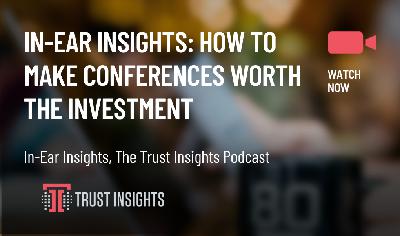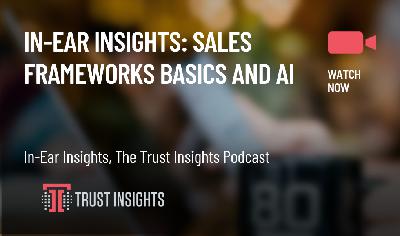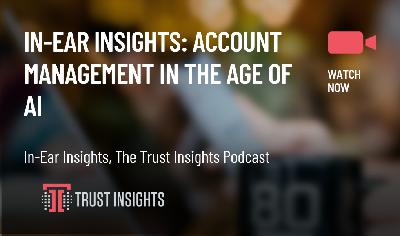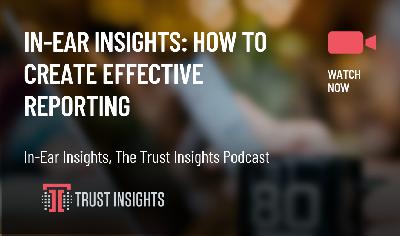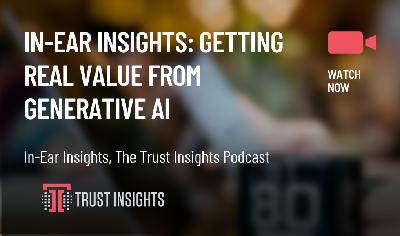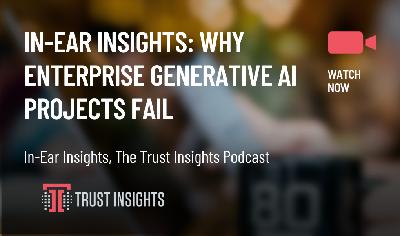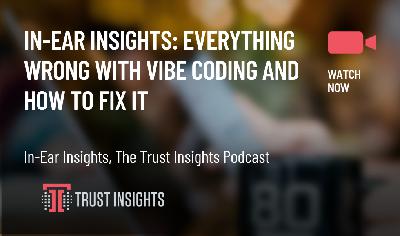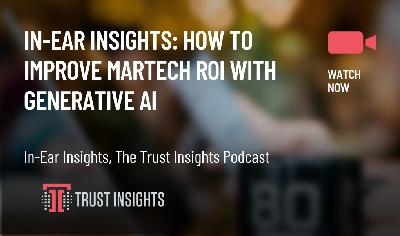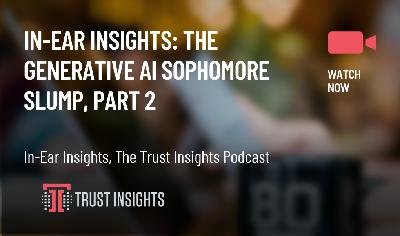In-Ear Insights: How to Make Conferences Worth the Investment
Description
In this episode of In-Ear Insights, the Trust Insights podcast, Katie and Chris discuss the worth of conferences and events in a tight economy.
You will learn a powerful framework for evaluating whether an expensive conference ticket meets your specific professional goals. You will use generative artificial intelligence to score event agendas, showing you which sessions offer the best return on your time investment. You will discover how expert speakers and companies create tangible value, moving beyond vague thought leadership to give you actionable takeaways. You will maximize your event attendance by demanding supplementary tools, ensuring you retain knowledge long after you leave the venue. Watch this episode now to stop wasting budget on irrelevant professional events!
Watch the video here:
Can’t see anything? Watch it on YouTube here.
Listen to the audio here:
https://traffic.libsyn.com/inearinsights/tipodcast-how-to-make-conferences-worth-the-investment.mp3
- Need help with your company’s data and analytics? Let us know!
- Join our free Slack group for marketers interested in analytics!
[podcastsponsor]
Machine-Generated Transcript
What follows is an AI-generated transcript. The transcript may contain errors and is not a substitute for listening to the episode.
Christopher S. Penn – 00:00
In this week’s *In Ear Insights*, let’s talk about events, conferences, trade shows, workshops—the gamut of things that you could get up from your desk maybe, go somewhere else, eat hotel chicken, and enjoy speaking. The big question is this, Katie: In today’s absolutely loony environment, with the economic uncertainty and the budgets and all this and that, are events still worth it? This is a two-part question: Are events still worth it for the attendees, and are events still worth it for companies that want to generate business from events?
Katie Robbert – 00:50
It’s a big question. And if our listeners are anything like me, it takes a lot to get them to put on real pants and actually leave the house—something that isn’t sweatpants or leggings or something like that—because you’re spending the time, the resources, the money to go out and actually interact with other people.
In terms of an attendee, I think there can be a lot of value, provided you do your homework on who the speakers are, what their expertise is, what they’re promising to teach you in the workshop or the session or whatever the thing is. The flip side of that is it can be worth it for a speaker, provided you know who your audience is, you can create an ICP, and provided you are giving value to the audience.
Katie Robbert – 01:54
So if you’re a speaker who has made their whole career on big ideas and thought leadership and all that’s fine, people have a hard time buying something from that and saying, “I know exactly what it is I need to do next.”
So there is a time and place for those speakers. But for an attendee to really get value, you need to teach them something. You need to show them how to be very tactical, be very hands-on. That’s where an attendee is going to get more value. So I would say overall, I think events are worth it provided both the attendee and the speaker are doing their homework to make sure they are getting and providing value.
Christopher S. Penn – 02:44
Yep. The trifecta has always been speaker, sponsor, attendee. So each entity has their own motivations. And one of the best things that you can do, even before signing up for an event while you’re considering them, is to actually make a user story. So for me, Christopher Penn, as a keynote speaker, I want to speak at, say, Davos, so that I can raise my stature among professional speakers by speaking at the World Economic Forum. That’s just a simple example.
It becomes pretty clear then that event fits my “so that,” which maps to the 5P framework. So I have a purpose as a speaker, I have a performance, I have a known outcome that I want.
Christopher S. Penn – 03:35
And then I have to figure out: Does the event provide the people, process, and platform to get me to my purpose and achieve the performance that I want?
As an attendee, you would do the same thing. One of the reasons why I pretty much never go to events unless I’m speaking at them is because when I do this user story for myself, as an AI data scientist: “I want to learn the latest and greatest techniques and methodologies for using generative AI models so that I can improve the productivity of my work and scale AI faster.”
When I use that user story, there’s a single event that matches that user story. None. Zero. Why? Because all of the stuff that fulfills that is not at events. It is in the steady stream of academic papers being published every day.
Christopher S. Penn – 04:34
It is in the research that’s being done, in the code repositories that are being published on places like GitHub. And I know myself and how I work. I will get immediate benefit by going to someone’s GitHub repo, checking out the code, and saying, “Okay, well how do I make this work for Trust Insights or this client or that client.” An event doesn’t do that for me.
Now, if my story was, “As a speaker, I want to go to this event so that I can network with this group of companies,” that does make sense. But as an attendee, for me, my user story is so specific that events don’t line up for me.
Katie Robbert – 05:12
And I think that’s something that, so every year during event season, companies are sending their. They’re like, “Oh, we got three tickets, let’s send three people.” The thing that always bugged me about that wasn’t that they were spending the time to send people, it’s that there was no real action plan. What are they supposed to get out of it? What are they supposed to bring back to the company to help other people learn?
Because they’re not inexpensive. You have to get the ticket to the event, then you have to get travel to the event and lodging to the event, and then you have to eat at the event. And some events are better than others about actually feeding people. And so those are just expenses that you have to expect.
Katie Robbert – 05:58
And then there’s also the lost time away from client work, away from the day-to-day. And so that’s a sunk cost as well. So all of that adds up to, “Okay, did you just send your employees on a vacation or are they actually getting something out of it that they can bring back to their organization, to their team?” to say this is the latest and greatest.
That is a big part of how attendees would get value: What is my KPI? What am I supposed to get out of this? Maybe it’s literally, “My goal is to meet 3 new people.” That’s an acceptable goal, as long as that’s your goal and then you do that. Or my goal is to understand what’s going on with agentic AI as it applies to social media.
Katie Robbert – 06:55
Okay, well, those sessions exist. And if you’re not attending those sessions, then you’re probably just standing over at the coffee cart, gossiping with your friends, missing out on the thing that you actually went there to learn.
But you need to know what it is that you’re doing in the first place, why are you there. And then figure out what sessions match up with the goals that you have. It sounds like a lot of work. It is. But it’s worth it to do that homework upfront. It’s like anything else. Doing your requirements gathering is going to get you better results when you actually start to execute.
Katie Robbert – 07:31
Events can be really overwhelming because there’s a lot going on, there’s a lot of concurrent sessions, there’s a lot of people, there’s a lot of vendors, there’s a lot of booths, whatever. It can be really overwhelming. But if you do your requirements gathering upfront to say, “As a persona, I want to [goal] so that [outcome],” and you look at the agenda and you say, “These are the sessions that are going to help meet my ‘so that,’ meet my performance, help me understand my purpose and get to that goal faster,” then you have a plan. You can at least sort of stay on track. And then everything else is just kind of extra and auxiliary.
Katie Robbert – 08:11
As a speaker, again, you have to be thinking about it in those terms. Maybe you create some user stories for attendees from your ICP and you say, “If my ICP is a B2B marketer who’s about a 101, 102 with agentic AI, then what can I teach them that’s going to bring them into my session and give them an immediate takeaway and value?”
Christopher S. Penn – 08:41
Yep. One of the—so for those who don’t know, we’re hosting our first event as a company in London on October 31, 2025. If you’re listening to this after that date, pop by the Trust Insights website because we are planning potentially some more events like this. It’s a full-day workshop. And one of the things that is nice about running your own event is you can ask attendees, “What do you want to learn from this?”
I was looking at the responses this morning, going, “Wow, this is…” There’s a wide range. But one of the ones that stuck out is exact

